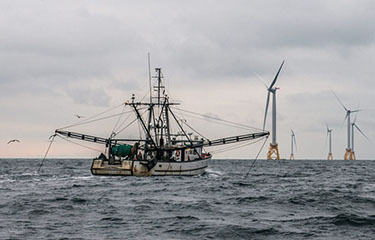NOAA’s Northeast Fisheries Science Center (NFSC) and the University of Rhode Island have formed a five-year partnership agreement to research the impacts of wind energy development on the U.S. marine ecosystem and marine industries.
NOAA said the partnership will examine how people who live near or work on the ocean are affected by wind energy development.
“Our science center and URI bring a deep bench of scientific expertise and experience in oceanography, marine life, fisheries, and coastal communities,” NFSC Research Director Jon Hare said in a release.
The agency said the program is taking a “multidisciplinary approach” that will examine the complicated relationships between wind energy and marine ecosystems.
The partnership will allow NOAA to call on URI for science, outreach, and education expertise and resources.
“It will allow NOAA to respond to pressing and shared marine resources issues tied to offshore wind energy development,” NOAA said. “NOAA and URI are considering efforts to ensure that vessel-based data captured on commercial fish species can be adapted to accommodate navigation in wind farms.”
Navigation and safety around southern New England wind turbine arrays is a continuing and contentious issue among the commercial fishing industry, NOAA and the federal Bureau of Ocean Energy Management. The Responsible Offshore Development Alliance was formed in June 2018 as a lobbying group to represent the East Coast fishing industry in its discussions on wind energy, and that group has repeatedly criticized offshore wind proposals that they say don’t address potential conflicts between wind turbines and fishermen.
“Integrating offshore wind energy responsibly and resourcefully into our already complex and increasingly crowded marine ecosystems and environments is a priority issue for URI leadership,” Bethany Jenkins, URI’s interim vice president for research and academic development, said.
The partnership between URI and NOAA was made through a cooperative research and development agreement, which allows federal and non-federal partners to do collaborative research. Through these agreements, NOAA and non-federal partners share ideas, technical expertise, facilities, and other research materials.
The center’s wind energy team is primarily located in Narragansett, Rhode Island, near the URI Graduate School of Oceanography.
The URI Coastal Resources Center at the Graduate School of Oceanography, Rhode Island Sea Grant, and the Coastal Institute are providing key support for the university in the partnership. They will draw on expertise and collaboration from other URI entities, including the College of the Environment and Life Sciences, the Ocean Engineering Department and College of Engineering.
The university was instrumental in assisting Rhode Island state officials with the science and policy work to create the Rhode Island Special Area Management Plan (Ocean SAMP), which provided the siting and management of the Block Island Wind Farm, which was the first U.S. commercial offshore wind project when it became operational in 2016.
Photo courtesy of Deepwater Wind







